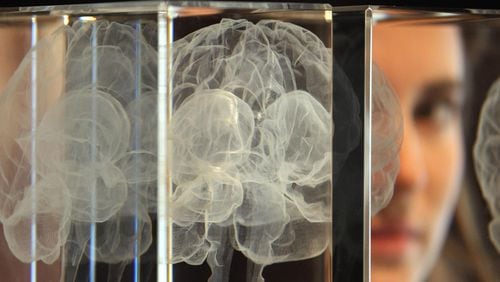In honor of what would have been German physicist Max Born's 135th birthday, the Google Doodle team put together a colorful illustration for the search engine's home page.
Born is remembered for his major contributions to quantum mechanics, a field of study that has led to the invention of computers, lasers, medical imaging devices and more.
Here are six things to know about Born and his groundbreaking work in quantum mechanics:
He was born in Breslau, Germany — now Wrocław, Poland.
According to Biography.com, Born was born into a family of "upper-class Jewish academics" on Dec. 11, 1882. His father was an anatomy and embryology professor and his mother, who died when Born was only four years old, came from a family of local industrialists.
He made his local university a renowned home for remarkable physicists.
Born was a professor of theoretical physics at the University of Göttingen, for 12 years. Several "soon-to-be-well-known" scientists joined the institution, including Werner Heisenberg, Enrico Fermi, J. Robert Oppenheimer and Maria Goeppert-Mayer.
He was friends with Albert Einstein.
Einstein and Born became friends while studying the theory of relativity. Born was a professor at his hometown university when he first met Einstein, according to Biography.com.
The two famously approached science in very different ways.
"Born, in holding that the basis of the material world was the purely random behaviour of the constituent particles of atoms, shared the majority viewpoint among quantum scientists; yet Einstein persisted in thinking that every event must have its cause, and searched constantly for a deeper explanation which might bring order into the seemingly chaotic sub- atomic world," German theoretical physicist Werner Heisenberg wrote for a 1971 book on the two scientists' friendship, "The Born Einstein Letters."
In spite of their scientific differences, the two carried a close friendship for more than 40 years and often wrote to each other. Their correspondence was published in the 1971 book.
Born also worked with future Nobel prize winner Otto Stern in Frankfurt, Germany, after World War I.
Born was forced to emigrate to England when Hitler rose to power in Germany.
In 2013, Born's son, Gustav Born, told BBC.com that in early 1933, Einstein told his father to "leave immediately" while they were still able to travel.
When Hitler took control of Germany, Born and his fellow Jewish scientist colleagues were not allowed to work at the local university and eventually packed their bags for England.
In 2011, Cambridge University unveiled a 1935 letter from Hitler himself expelling Born, the "father of quantum mechanics" from his post at Göttingen University.
Born had a to give up running the institute and his wife was heartbroken.
"They hated to be uprooted in this crude and dangerous way," Gustav told BBC.com. "My parents were pretty sure this was a one-way journey."
In 1933, when Jewish academics such as Born were being threatened under Nazi Germany, Einstein gave a speech in support of the Academic Assistance Council, which aimed to rescue Jewish and politically vulnerable academics during Hitler’s rise to power in Germany. Watch:
He was awarded the Nobel Prize in 1954 for the Born Rule.
Born earned the prize for his work in the field of quantum mechanics, specifically for the Born Rule, which Google described as "a quantum theory that uses mathematical probability to predict the location of wave particles in a quantum system."
"In quantum mechanics, particles don't have classical properties like 'position' or 'momentum'; rather, there is a wave function that assigns a (complex) number, called the 'amplitude,' to each possible measurement outcome," Caltech physicist Sean Carroll wrote in his blog. "The Born Rule is then very simple: it says that the probability of obtaining any possible measurement outcome is equal to the square of the corresponding amplitude."
Here’s the Born Rule equation: Probability(x) = |amplitude(x)|^2
Born’s theory now serves as the basis for almost all quantum physics predictions.
He died on Jan. 5, 1970.
Born died at age 87 at the Goettingen University Medical Clinic. According to the Pittsburgh Post-Gazette, his "death was caused by a heart ailment complicated by aerterial (sic) thrombosis."
About the Author






